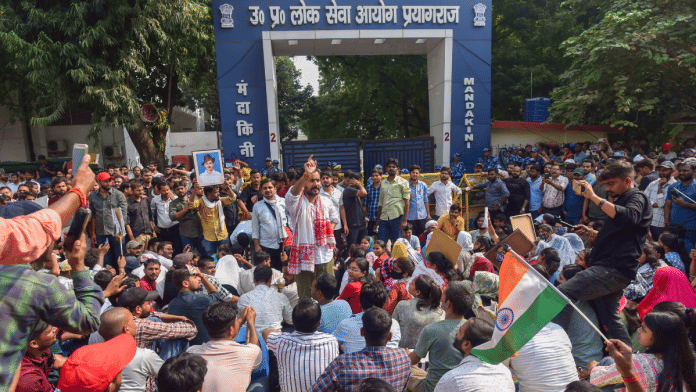New Delhi: Thousands of Uttar Pradesh Public Service Commission (UPPSC) aspirants protesting for the third straight day outside the UPPSC office in Prayagraj are struggling to secure necessities, such as food and water.
Students are rallying against the UPPSC proposal to conduct the review officer or assistant review officer (RO/ARO) and UP provincial civil service (PCS) exams in two shifts. They argue that multi-shift exams risk unfair normalisation, where scores are adjusted based on variations in test difficulty across shifts.
“I walked two kilometres yesterday just to find water. We are struggling to get food and water at the protest site. Police have forced shops and eateries to shut down, hoping we’ll give up and leave, but we are here for a cause and will not leave until our demands are met,” said Alok Thakur, an aspirant who has been at the protest site for the last two days.
The protest initially led to clashes with the police after students gathered at gates 2 and 3 of the UPPSC office premises. Officers reportedly resorted to lathi-charge to disperse the crowd. Despite the hardships, the exam aspirants have held their ground, spending two nights at the site. Many women aspirants who have joined the protest have, so far, not even informed their families about their participation.
“We told our parents we are studying. They will not allow us to protest, but we need this. I have put everything into preparing for this exam, and the system keeps playing with our future,” said Malini Pandey, one of the protesters.
The police, aiming to maintain order, have designated an area near the Civil Lines police station for students to protest peacefully.
“Aspirants have been asked to go to the designated dharna spot in the church area under the Civil Lines police station to continue their protest peacefully. Their concerns will be communicated to higher officials,” said Abhishek Bharti, Deputy Commissioner of Police, Prayagraj.
With posters that read “Na batenge na hatenge (We will not be divided nor back down)”, students are echoing Chief Minister Yogi Adityanath’s slogan, “Batenge toh katenge (Divided we fall)” to reflect their strong sense of solidarity.
The students’ demands have started resonating beyond Prayagraj. Aspirants in Delhi organised a rally Tuesday evening, and similar protests will likely happen in Patna and Jaipur. Many protesters in Prayagraj have travelled from states such as Bihar, Madhya Pradesh, and Delhi. They shared buses and are now sharing rooms to participate in the movement.
“People have come here from Bihar, Madhya Pradesh, Delhi, and other parts of UP. We would rather study in our rooms, but the commission keeps failing us. They cancelled the last exam because of a paper leak—that was on them. It is their responsibility to conduct exams properly. If we are saying this format will not work, why can not they change it?” said Divyansh Yadav, a protester.
‘We only want a fair shot’
More than 11 lakh candidates will appear for the UPPSC RO/ARO exam, initially scheduled for January 29 and February 2 but postponed following a paper leak.
The UPPSC’s recent notification rescheduled the exam for December and introduced the controversial two-shift format, sparking protests among students who feel the structure disadvantages them.
“We’re paying for the commission’s failures. It takes so much mental strength to return to the drawing board, study for months, and then find out they are repeating the same mistakes. This exam is for us, but they are making us jump through hoops,” said Yadav.
The protests have drawn attention from heavyweight political leaders, with Samajwadi Party chief Akhilesh Yadav and Congress leader Priyanka Gandhi even voicing their support for the protesting students.
However, the aspirants remain sceptical about such support, stressing that real support means joining them in person.
“We do not care about social media posts. If they care about students, they will come here and sit with us. Writing on social media means nothing,” said Mohan Kumar, another protester outside the UPPSC office.
The UPPSC has defended its decision, citing logistical constraints, stating that managing a single shift for 11 lakh aspirants would require significant resources, which are not currently available.
According to a source within the UPPSC, the two-shift approach aligns with a June government order mandating multiple shifts for exams with over five lakh registered candidates.
“It is challenging to conduct exams for over 11 lakh students in one shift due to resource constraints. Multiple shifts were proposed to address these challenges,” said a UPPSC official.
However, students who have invested years in preparation fear the smallest disadvantages score normalisation can introduce.
“Normalisation is not fair. A single mark can decide whether you pass or fail, and in government exams, each mark counts. The commission says it is for our benefit, but we are the ones who will be facing the consequences,” said Rakesh Singh, an aspirant from Lucknow.
Meanwhile, the protesting students have been sharing rooms, food, and resources to support each other, underscoring their commitment to the cause.
“We are staying with friends or paying for shared rooms. Some have been walking long distances to get water or food. If this exam goes forward, as the commission has planned, it will affect all of us, so we have no choice but to stick together,” said Priya Verma, a protester.
With protests gaining traction, students fear their demands may still go unmet unless sustained pressure forces a change. Many have underscored that fair scoring practices are crucial for their futures in a competition for limited posts.
“We do not want any favours. We only want a fair shot. The commission needs to understand that its decisions affect our lives and careers. If it will not listen, we will keep protesting until it does,” said Yadav.
(Edited by Madhurita Goswami)
Also Read: After UPSC, India’s coaching industry has found a new gold rush—judicial services






